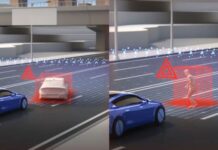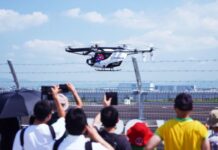Taiwan – Mumbai – The world is amazed by Taiwan: The Asian island state has survived the Corona pandemic surprisingly well. The country has only 500 corona cases and seven deaths among 23 million inhabitants. One reason is the intensive use of digital technologies to contain the virus. Numerous Taiwanese companies, including some start-ups, have used the corona pandemic as an incentive and developed innovative products in record time to mitigate the impact of the disease on individuals and society. Taiwan Excellence presented four of these companies and their innovations at its online press conference “Innovations for the New Normal – Smart Ideas & Robotic Use Cases” recently. Here are some examples:
- Airvida C1 by ible Technology is an air purifier for children between 3 and 10 years old, which weighs 22 grams and is worn like a necklace. It eliminates particles in the air by generating two million negative ions every 0.6 seconds. The negative ions bind the harmful particles and convert them into larger particles that fall to the ground. Airvida C1 removes 99.9% of particulate matter and 90.8% of bacteria from the air you breathe.
- New Era AI Robotic has developed a series of service robots, including an autonomous vehicle that sprays disinfectant from a tank. The Disinfectant Spraying Robot can cover an area of 300 square meters in 30 minutes, and it also kills germs on handrails or seats. The Smart Ward Robot is an interactive service robot. It was developed especially to relieve the workload of medical staff in hospitals. The Temperature Measuring Robot is equipped with a thermal imaging camera and face recognition. It can detect and identify people with elevated body temperature even in large crowds, such as at airports. The robot moves autonomously and coordinates with other robots to quickly achieve high coverage in new locations.
- From QNAP Systems comes the KoiBot, an assistant that is capable of speech recognition and automatic translation. At the reception it takes over the reception and registration of guests by turning its screen in the direction of the person speaking. Because the reception desk is not manned by people, the risk of infection is reduced. If a guest still needs human help, KoiBot sets up a video conference for up to four participants. This is also useful so that health personnel can remotely monitor the progress of patients’ illness without exposing themselves to the risk of infection.
- Roxie from Carkit AI is a karaoke system for the car. It consists of a special long-range hands-free microphone that allows the driver and passengers to sing together. The software reduces the vocals in songs of any music app. Users can even sing to the latest hits for which there are normally no karaoke versions. Roxie recognizes and reduces vocals from songs in many languages, including English, Chinese, Japanese, Spanish and Indian languages.
For more information, please visit http://www.taiwanexcellence.de or http://www.taiwanexcellence.org/en


















